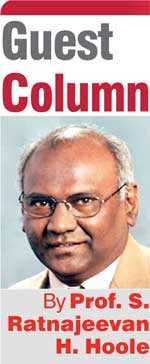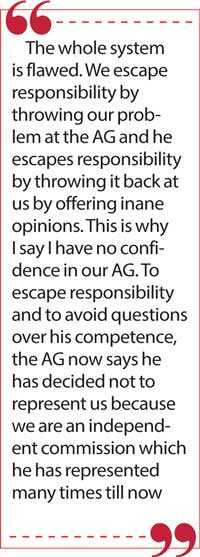Friday Feb 20, 2026
Friday Feb 20, 2026
Friday, 15 May 2020 00:00 - - {{hitsCtrl.values.hits}}

On 11 and 12 May, several newspaper and websites quoted the Attorney General as stating in Court that day that he could not represent the Election Commission in the ongoing FR petitions on the  Parliamentary Elections.
Parliamentary Elections.
The Attorney General represented by ASG Indika Devamuni de Silva said that the AG would represent only State institutions named as Respondents. The EC was not considered a public institution; it was an independent commission. Therefore the AG Department would not represent the Elections Commission or its Chairman, the ASG added.
Nonsense. Pure spin. The EC has been an Independent Commission from late 2014 and has been represented by the AG in dozens of cases. When did the AG discover that he cannot represent Independent Commissions?
In recent times, there had been an issue between the President and the Commission. The Commission saw as impossible, as a corollary to the President’s Gazette of 2 March, the holding of elections in time for the new Parliament to meet on 2 June as required in the Constitution.
We therefore had written to the President (through his Secretary Dr. P.B. Jayasundera) asking him to seek the advisory opinion of the Supreme Court on what to do. The Presidential Secretary refused on behalf of the President, although article 33(1)(d) enjoins the duty on the President to “on the advice of the Election Commission, ensure the creation of proper conditions for the conduct of free and fair elections and referenda.” In my opinion the President thereby failed in his duty. The point here however is that the President and the Commission were at odds.
In the present case the AG was representing us, the EC and at the same time effectively the President. The AG had been given Chairman Mahinda Deshapriya’s proxy and responses drafted by our legal staff. The AG’s responded by letter dated Wednesday 6 May asking for all three Members’ proxies and responses to every averment in the petition from each of us three. He set a deadline of 8 May.
In many past cases the AG had claimed to speak for me without my proxy. In one case when my lawyer Hejaaz Hizbullah appeared for me, the Court refused to believe him as the AG purported to represent me. The Court then sent someone to the Registry to confirm that I had indeed given my proxy to Mr. Hizbullah. May God keep Mr. Hizbullah safe as he suffers in prison as a large section of the legal fraternity seems to have abandoned him in sheer fright and anti-Islamic frenzy.
In the present case when my Assistant Commissioner (Legal), responding to the AG’s conditions, asked me for my proxy signed over to the AG, I refused. This is a case where the President was effectively made a Respondent by the Petitioner naming the AG as a Respondent in his place.
Given the conflict of interest between the President and the EC, whose interests would the AG represent? He had to choose one of us. I therefore on Sunday 10 May refused to give the AG my proxy, telling him that I had no confidence in his judgement.
I believe it is to save face when his neutrality, judgement and ability to handle two clients in fairness are questioned, that the AG discovered that he cannot represent Independent Commissions. He responded on 10 May itself saying he will not represent us. 
Just recently, 16 March, a statutory nomination date had been declared a public holiday. The EC did not accept nominations which raises legal questions over not accepting nominations during the seven days from 12 March to 19 March (not counting Sunday 15 March. Then 17, 18 and 19 March, all statutory nomination days, were declared public holidays. These public holidays are “dies non, short for dies non juridicus” (days on which no legal work can be done). This makes the nominations tainted and therefore invalid.
There are arguments at the EC about whether it is our fault (for not knowing those were public holidays) or the fault of the Ministry of Public Administration that issued a Circular on 17 May at 1:45 a.m. saying they are special holidays when emergency services such as at the Secretariat would be open (allowing nominations to be accepted), and then issuing a gazette perhaps backdated saying they are public holidays.
All that is however irrelevant as those whose nominations were unlawfully accepted and the nominees and those who intend voting for the nominees will have their fundamental rights violated if the courts order those nominations rejected.
Another fault regarding nomination involves the affidavits of candidates using English forms without the space for saying where it was executed. So several nominations of those who filed in English were rejected. The way it works if one person is faulted, the whole party or independent group has its nominations thrown out.
Again there is no point in arguing whether it was the Commission’s failure in proof-reading the nominations or that of the notaries of candidates for not knowing that every affidavit must enter the place where it was executed. The fundamental rights of candidates and their supporters were violated. We cannot be heard to say “Rex Non Potest Peccare, Latin for the king can do no wrong. Today when the king is wrong, he can be sued and is answerable.
The mistakes need to be admitted and the stripped citizens’ rights restored. In a good, modern society, that needs to be done, however costly doing so is. That defines how decent a society we are.
The Commission consulted the AG on this matter. I asked why, when we have the mental faculty and a President’s Counsel on our Commission to make up our own minds. The response is that if we are sued, it is the AG who will represent us. Alas, alas!
So we waited for the answer to our query on the nomination papers. He replied on 8 May: “It is observed that nominations have already been accepted by you in respect of the Parliamentary Elections of 2020. In this context, it is further observed that you have also taken consequential steps for the conduct of such elections. Therefore, in the circumstances, you are required to follow the procedure established by law for the conduct of such elections.”
I did not need a PC to tell me that I must follow the procedure established by law. The law requires rejecting tainted nominations. The AG himself has begun consequential steps in asking us for proxies and responses but is refusing to go for the next step in representing us in Court.
The whole system is flawed. We escape responsibility by throwing our problem at the AG and he escapes responsibility by throwing it back at us by offering inane opinions.
This is why I say I have no confidence in our AG. To escape responsibility and to avoid questions over his competence, the AG now says he has decided not to represent us because we are an independent commission which he has represented many times till now.
This conflict of interests issue is not new and the AG should be aware. In AG K.C. Kamalasabayson’s time (year 2005 or so), university dons were cheating on the circulars of the University Grants Commission. The AG decided to represent the academic cheats and the universities that granted promotions based on false claims by the cheats, and at the same time the UGC.
In Court the AG took up the position of the cheats and the universities. When Elmore Perera bringing suits on behalf of the Citizens’ Movement for Good Governance objected, and I on the UGC backed Perera’s stand, the AG, unable to defend his own position, threatened not to represent the UGC and finally agreed to back off. It seems that the AG’s never learnt its lessons and is back to cheating on behalf of the big fish.
Truthfulness and justice are inseparable. The AG as the chief Government lawyer must uphold the truth. Then justice for citizens will be served.